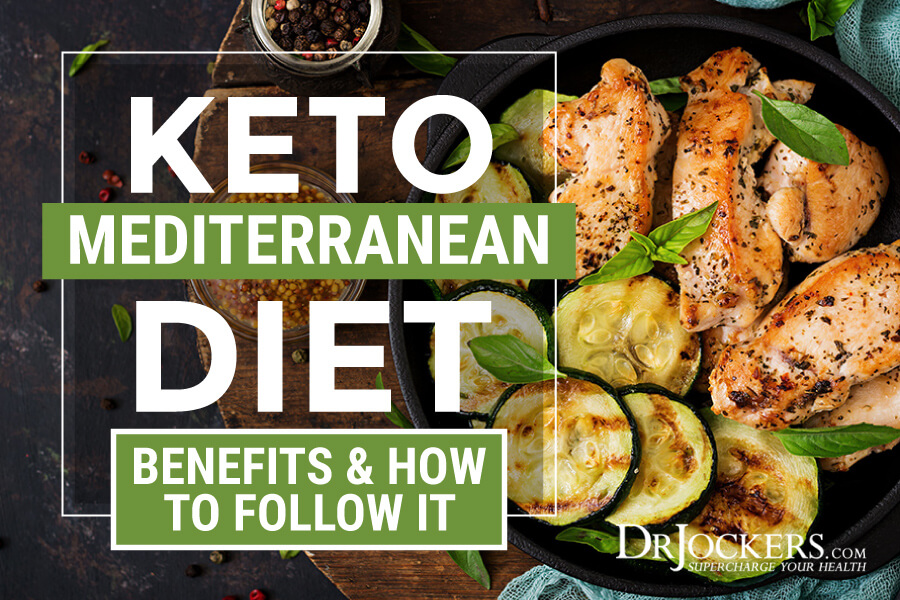 Keto Mediterranean Diet: Benefits & How To Follow It
Keto Mediterranean Diet: Benefits & How To Follow It
The Mediterranean diet is often recommended by health practitioners, magazines, and websites. While it certainly has several health benefits, it has some drawbacks. The keto diet offers more benefits in some regards. However, combining the two may be your best bet.
In this article, you will learn what the Mediterranean diet and the keto diet are. You will understand the differences between the two as well as their pros and cons. You will learn about the benefits of combining the two diets and what to eat with the Keto Mediterranean diet.

What is the Mediterranean Diet?
The Mediterranean diet has been a popular diet for a long time. There is extensive research on its potential health benefits.
Intensive research has looked at the health outcomes of nearly 13,000 middle-aged men in the United States, Italy, Greece, Finland, Japan, and the former Yugoslavia. What they found is that participants in Crete, a large Greek island in the Mediterranean sea, had a lower rate of heart disease than those from other areas. Researchers linked these findings to the diet of the participants which mainly included fruits, vegetables, beans, and fish, a typical post-World War II “poor diet” (1).
Other research has linked the ‘traditional’ Mediterranean diet to a number of health benefits, including longer life span, improved body compositions, lower levels of blood pressure and LDL cholesterol, improved brain function, and lower risk of cancer, heart disease, type 2 diabetes, stroke, heart attack, and Alzheimer’s disease (2).
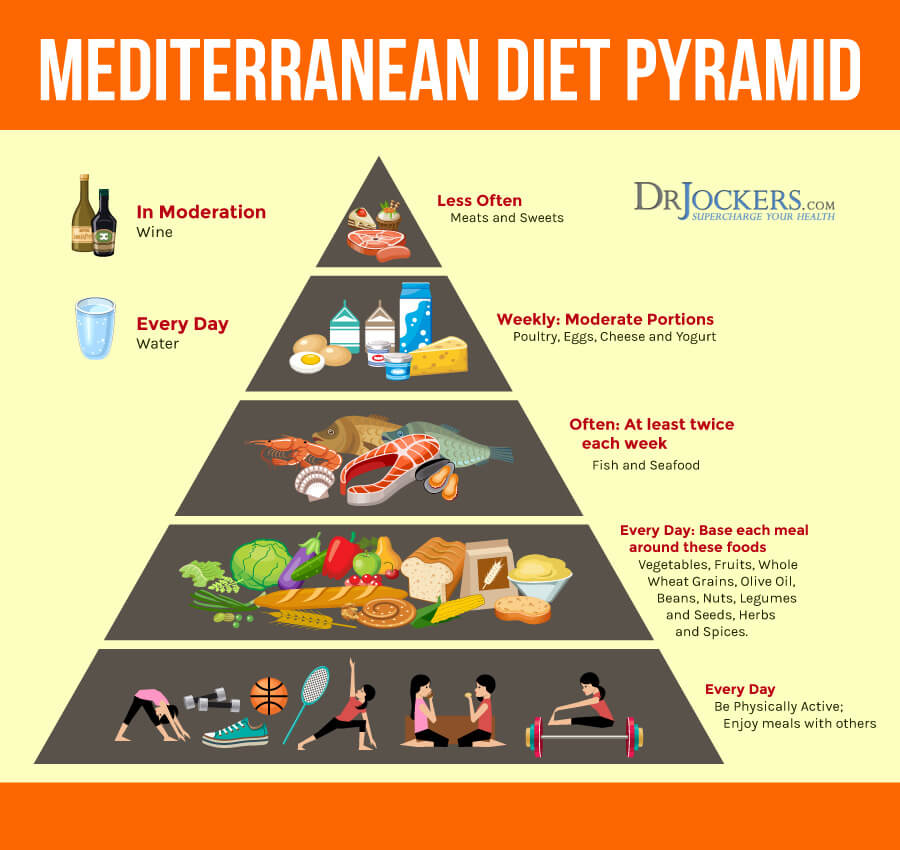
What is the Mediterranean Diet Made Up Of?
What is the so-called ‘traditional’ Mediterranean diet? While there is no exact science or strict rules to it, according to extensive research, the Mediterranean diet generally consists of 50 to 60 percent carbohydrates, mostly from fruits, starchy vegetables, and whole grains, and 25 to 35 percent of fat with an emphasis on natural unsaturated fats, such as olives, olive oil, and fish, and the remainder from protein.
The Mediterranean diet is rich in vegetables, fruits, nuts, seeds, legumes, whole grains, bread, potatoes, herbs, spices, fish, seafood, and olive oil, and includes cheese, eggs, yogurt, and poultry in moderation. Red meat is rarely consumed with the Mediterranean diet and refined sugar, refined oils, processed meats, refined grains, sugary beverages, and highly processed foods should be avoided (3, 4).
The concept is simple: eat nutrient-dense, real, whole foods with a focus on carbs. While these nutrient-rich whole foods are healthy, because of its high emphasis on carbs, the Mediterranean diet may not be the best choice for you. While there is plenty of research on the weight loss and health benefits of the Mediterranean diet, the keto diet may provide more profound overall benefits and improvement for specific conditions. So how is keto different? Let’s look into it.
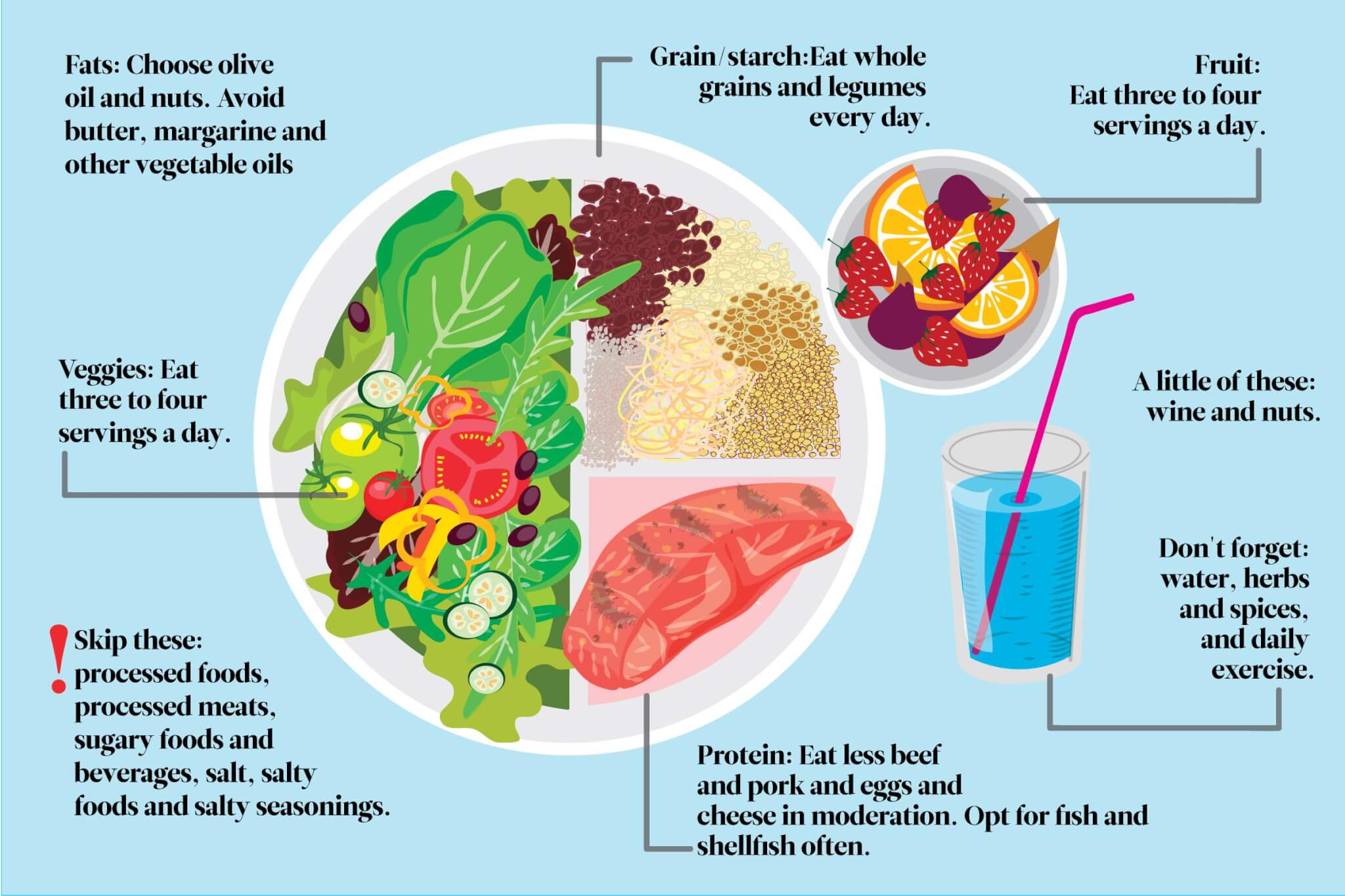
What Is the Keto Diet?
The ketogenic or keto diet is basically a diet that is very high in fats (60 to 80 percent of your daily calories), low in carbs (5 to 10 percent), and low-to-moderate in protein (20 to 30 percent). While you may think it is just the latest trend, the benefits of keto were actually discovered in the early 1900s for epilepsy.
It’s important to understand that keto is not just another term for any low-carb diet. While it is a type of low carb diet, it is very specific when it comes to the percentage of carbs you consume and your overall macronutrient ratio. The goal of the keto diet is not simply to limit carbs but also to achieve ketosis and its associated benefits.
Ketosis is a metabolic state when your body is using and burning ketones as an alternative source of fuel instead of carbs. To produce ketones, your liver needs to trigger ketogenesis and your body needs to enter ketosis. The simplest and most effective way to do this is by eating a very low carb keto diet.
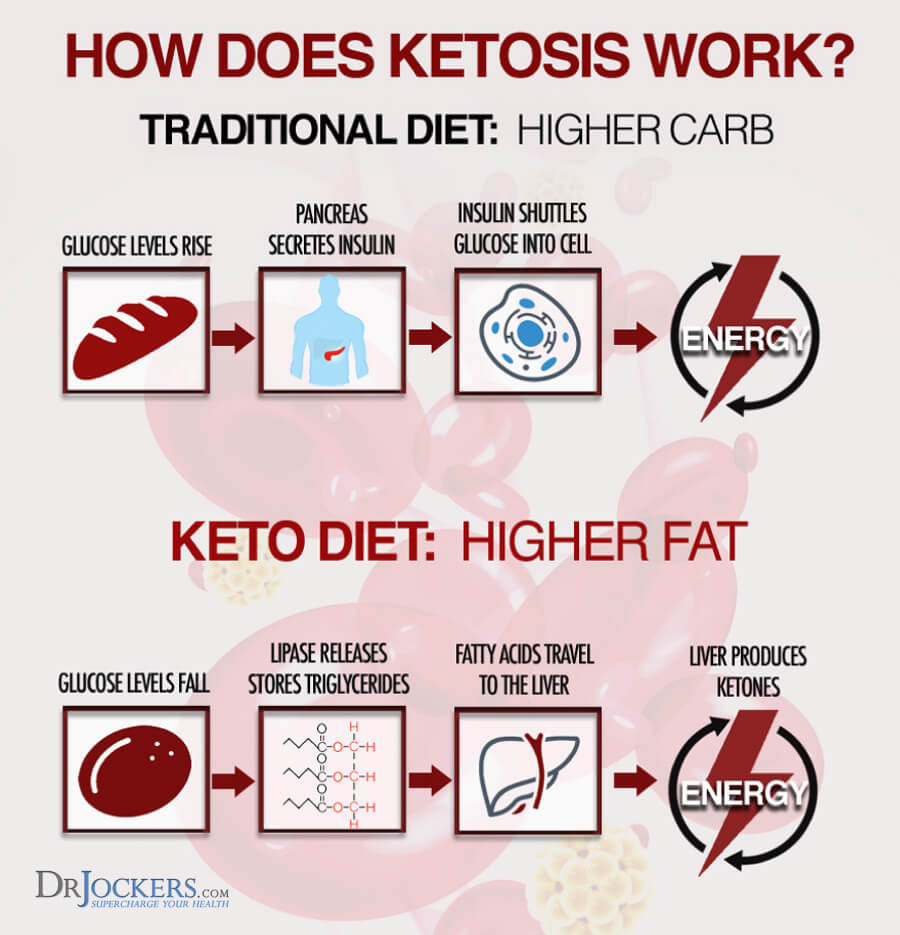
How Do You Get Into Ketosis?
So how do you achieve a very low carb ratio? It’s relatively simple. You need to eliminate all refined sugars, refined carbs, and processed carbohydrate foods. You need to limit your daily calories to roughly 5 to 10% carbohydrates. This means you should eliminate grains and starchy carbs like sweet potatoes as well as high sugar sweeteners like honey and fruit like bananas, watermelon, pineapple, etc.
You need to obtain most of your calories from healthy high-fat foods, such as avocados, olives, meats, such as pasture-raised beef, free-range poultry and eggs, and wild-caught fish, butter, ghee, raw cheeses, coconut oil, extra-virgin olive oil, nuts, and seeds. Additionally, low-carb vegetables, such as spinach, kale, broccoli, cucumber, and celery will help. It is important that you keep your carbs at 5 to 10 percent, fats at 60 to 80 percent, and protein at 20 to 30 percent to achieve ketosis and experience the benefits of the keto diet (5, 6, 7, 8, 9, 10, 11).
To learn more about the benefits of the keto diet, I recommend reading this article. To learn more about what to eat on the keto diet, I recommend reading this article about the Keto Food Pyramid.
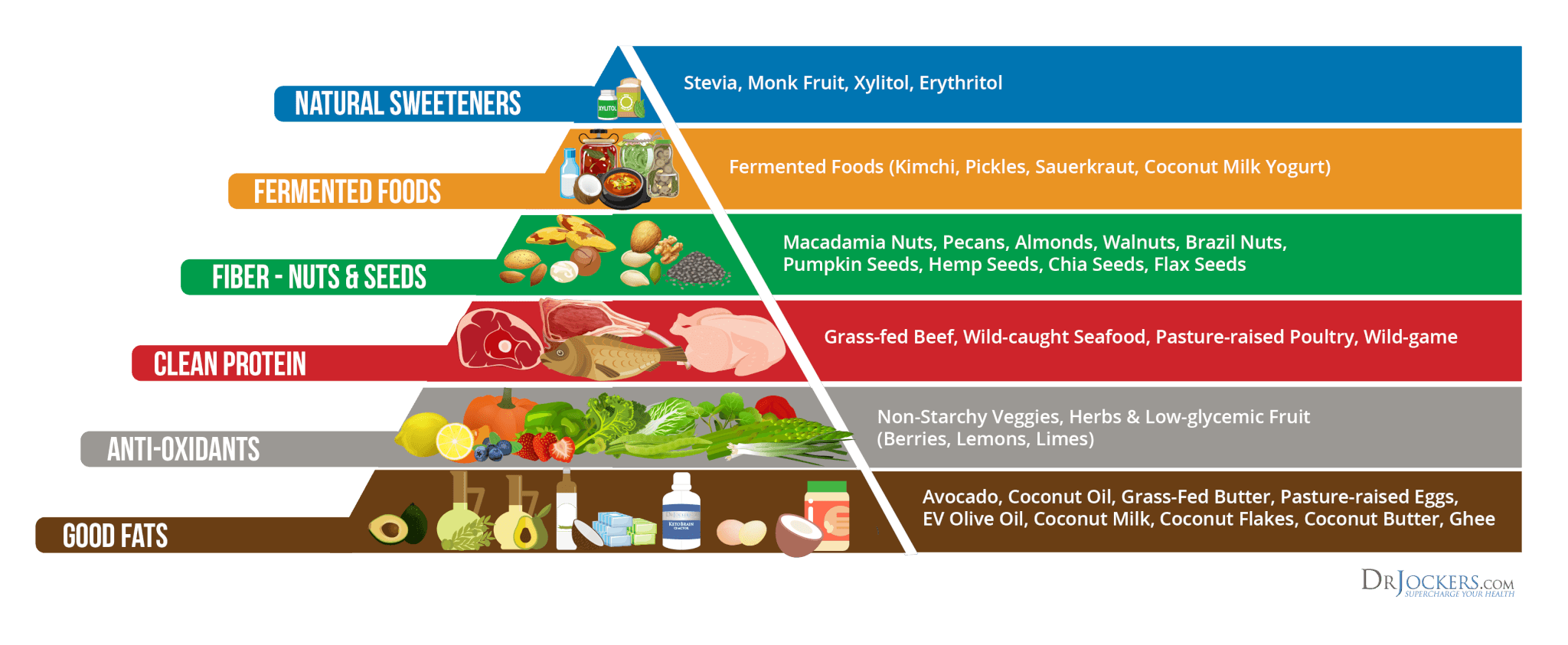
The Benefits of the Keto Diet
While the keto diet hasn’t been as extensively researched as the Mediterranean diet, a growing amount of evidence suggests that it may impact your health even more so than the Mediterranean diet or other diets. The benefits of the keto diet include fat loss, improved autophagy, more cellular rejuvenation, decreased insulin and blood sugar levels, improved insulin sensitivity, lower blood pressure, reduced triglycerides, better cholesterol, and reduced risk of diabetes, cancer, Alzheimer’s and other neurological conditions, and fatty liver diseases.
Some may criticize that the keto diet is too high in saturated fats and worry that it may increase the risk of high cholesterol and heart disease. While it may be true for a small percentage of the population with hypercholesterolemia, research has found that the keto diet may actually reduce the risk of heart disease and while optimizing cholesterol levels. While it seems that both the keto diet and the Mediterranean diet may lower your risk of heart disease, there is no research comparing the heart benefits of the two diets (12, 13, 14, 15, 16, 17, 18).
Until more research becomes published, learn more about the benefits of the two diets and the differences between the two in the next sections. You may find that trying a Keto Mediterranean Diet, a plan that combines the principles of both keto and the Mediterranean diet may be the best for you.
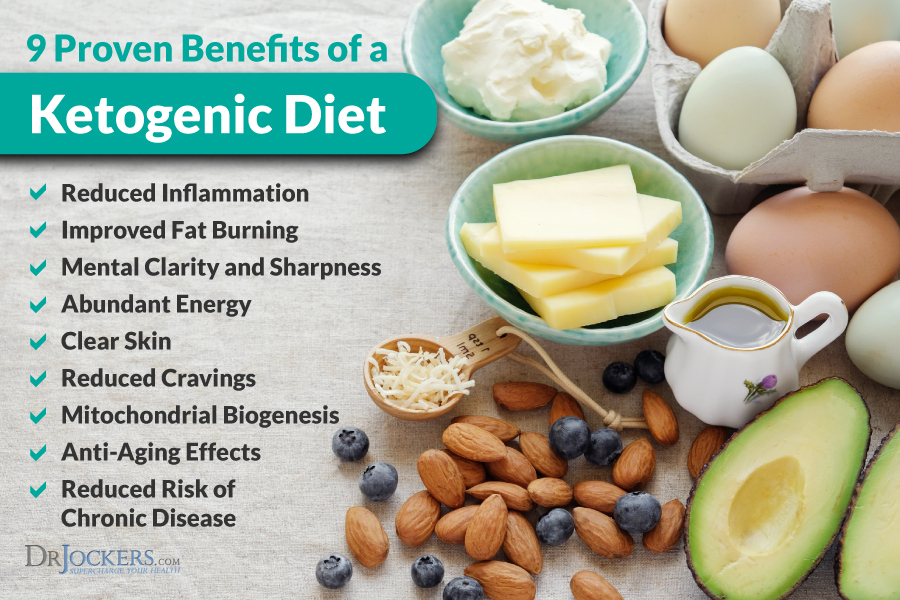
Differences Between Mediterranean & Keto Diets
You might have noticed that the Mediterranean and the keto diet share several common benefits and are similar in certain regards. However, there are some important differences that you need to understand.
The differences between the Mediterranean diet and the keto diet include:
- Carbohydrate intake: While the Mediterranean diet puts a high emphasis on eliminating refined sugars and consuming plenty of healthy fats, it also includes a generous amount of carbohydrates, including fruits, starchy vegetables, and whole-grain bread and pasta. In contrast, the keto diet includes very little carbohydrates. It limits even so-called ‘healthy carbs’, such as fruits or whole grains.
- Fat intake: While both the Mediterranean and the keto diet require much higher healthy fats in your diet than the standard American diet and standard low-fat diets, the Mediterranean diet is still much lower in fats than the keto diet. On the keto diet, your primary source of calories come from fats, while on the Mediterranean diet, the most calories come from carbs.
- Type of fats consumed: While both diets emphasize healthy fats, these fats differ in some regard. The Mediterranean diet focuses on natural unsaturated fats from fish and plant-based oils. While these fats may be included on keto, the keto diet recommends large amounts of and a large variety of saturated and healthy fats, including animal fats.

Mediterranean Diet Pros and Cons
The Mediterranean diet is one of the more researched diets existing. Studies support its health benefits and safety. It promotes nutrient-dense whole foods and the elimination of processed and junk foods. Because it’s so rich in nutrient-dense foods, it may reduce the risk of mineral and vitamin deficits. It may decrease bad cholesterol and the risk of cardiovascular disease.
While this sounds pretty good, the Mediterranean diet also has some downsides. It promotes a lot of carbs, including pasta, bread, and other whole-grain foods, which is easy to overeat on, which may lead to unwanted fat gain. For some, overeating on carbs my result in blood sugar issues, sugar crashes, and fatigue. The Mediterranean diet does not result in major changes in body composition and blood markers compared to the keto diet.
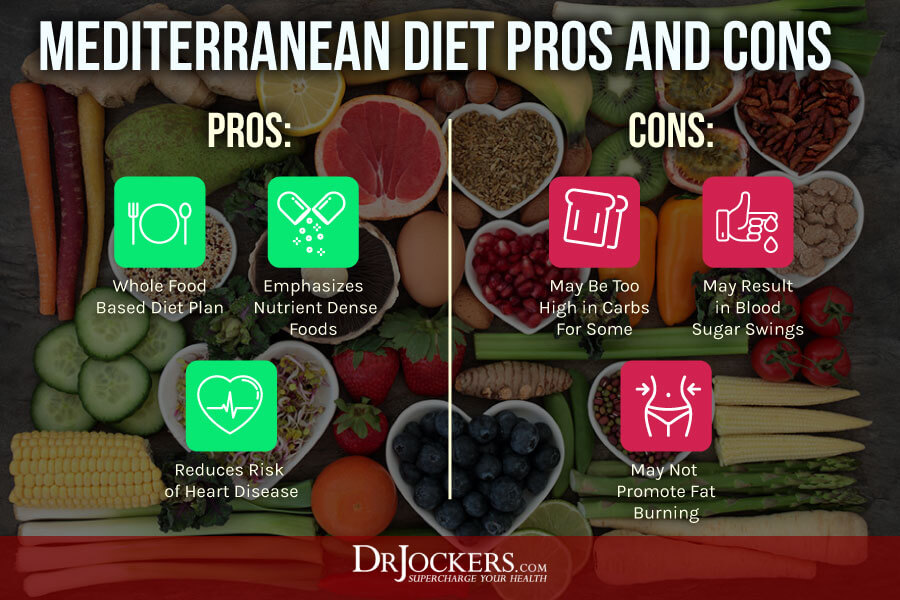
Keto Diet Pros and Cons
The keto diet has a long list of benefits. It may help fat loss, weight loss, and offer better body composition. It may help to reduce blood sugar levels, insulin, and triglycerides. It may help to reduce the risk of or help with the treatment of some major diseases, including epilepsy, type 2 diabetes, Alzheimer’s disease, Parkinson’s disease, PCOS, and cancer. It also promotes the elimination of foods that you may be tempted to overeat or binge on, including bread, pasta, and whole grains. It may help to reduce appetite and calorie intake leading to sustainable weight loss.
On the other hand, the keto diet can be difficult for some to start out with. It may lead to the keto flu during the first few days characterized by fatigue, headaches, and flu-like symptoms. When people focus on only their macros, instead of a real food keto plan, they may experience vitamin and mineral deficits and fewer benefits.
Those with hypothyroidism or adrenal-related issues may not always do well with a low-carb plan. People with hypercholesterolemia may also experience unhealthy cholesterol due to increased saturated fat in their diet.
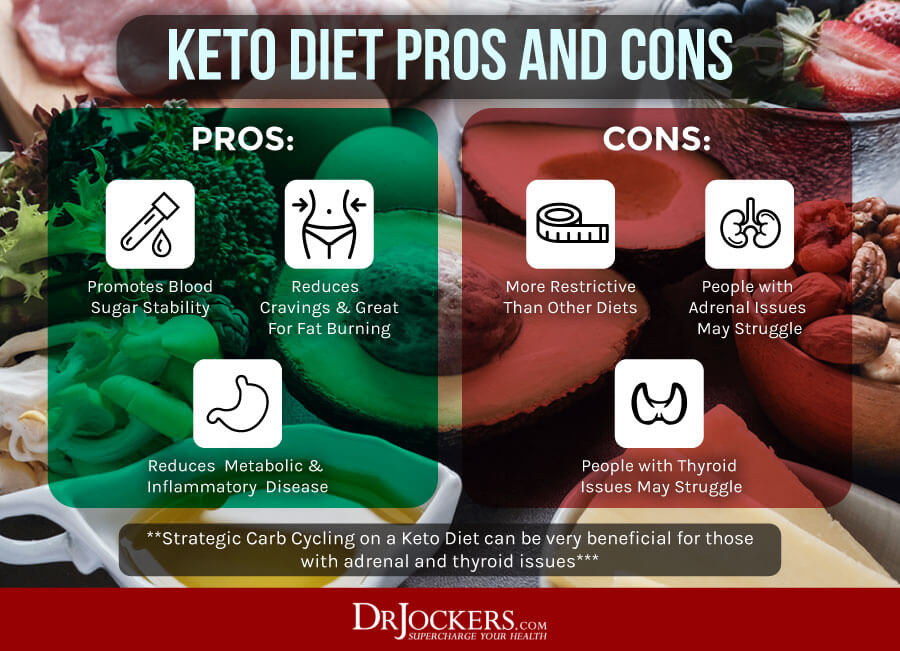
Introducing The Keto Mediterranean Diet
You may be excited about the benefits of the Mediterranean diet but worried about eating too many carbs and missing out on the benefits of ketosis. I have good news for you. The Keto Mediterranean Diet may be the right choice for you.
In 2008, researchers from Spain decided to combine the keto diet with the Mediterranean diet and look at its impact on one’s health. The diet included unlimited calories, olive oil as a major source of fat, fish, green vegetables, and 200 to 400 ml of red wine a day.
This Keto Mediterranean diet had similar benefits as the regular keto diet. Benefits included decreased body fat, glucose, triglycerides, and blood pressure, as well as, better cholesterol levels. Follow-up research has found similar benefits (18).
While more research is needed, looking at current data, the Keto Mediterranean Diet seems promising. While there isn’t yet an exact prescription for the Keto Mediterranean Diet, there are some key characteristics you can follow.
Restrict your carb intake in order to promote ketosis, appetite reduction, weight loss, and better blood sugar. Eat lots of monounsaturated and polyunsaturated fats, including olive oil and avocados. Eat plenty of fish, seafood, and poultry, and limit red meat. Supplement with Omega-3 DHA + EPA supplements in order to lower inflammation, insulin, and triglycerides. Eat lots of vegetables full of vitamins and minerals to prevent the keto flu and nutrient deficiencies.
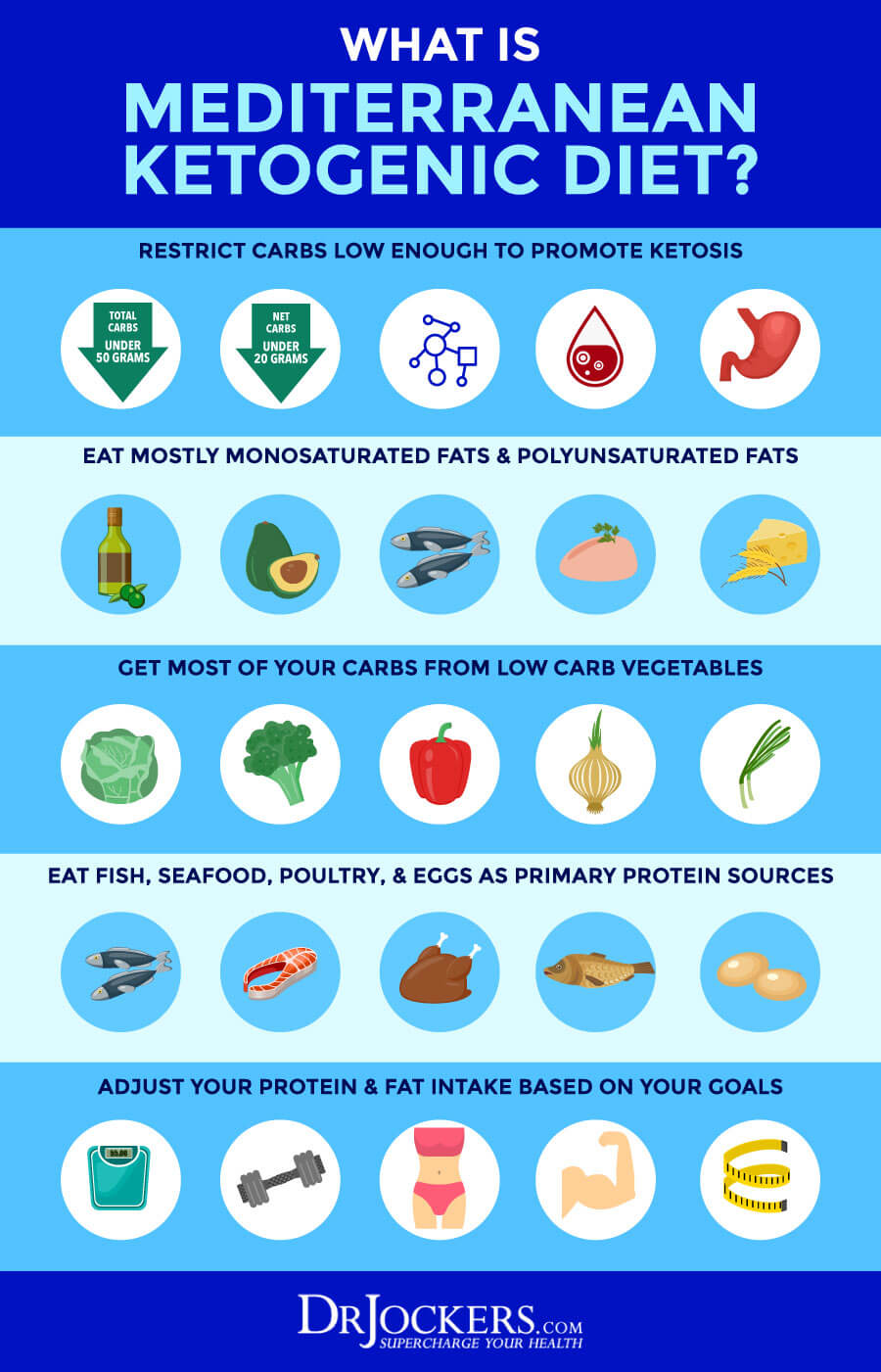
The Keto Mediterranean Diet Food List
If you are excited about the potential benefits of the Keto Mediterranean Diet, you probably can’t wait to get started. Don’t worry, it’s simple. All you have to do is follow this Keto Mediterranean Diet food list.
Foods that you should be focusing on include:
- Mediterranean clean protein sources: wild-caught fish and seafood, free-range poultry, and eggs
- Healthy fats and oils: avocado oil, MCT oil, coconut oil, and olive oil
- Low-carb vegetables: leafy greens, cruciferous vegetables, celery, cucumber and mushrooms
- Mediterranean herbs, spices, and flavoring: paprika, cumin, coriander, oregano, basil, parsley, garlic, mint, anise, cinnamon, lemon juice, and lime juice
Foods that you may eat in moderation include:
- Nuts and seeds: Brazil nuts, macadamia nuts, pecans, cashews, chia seeds, flax seeds, hemp seeds, pumpkin seeds, and sesame seeds
- High-fat dairy: full-fat cheeses, yogurt, and heavy cream
- Low-carb fruits: berries, lemon, lime, melon
- Red meat: pasture-raised beef, veal, lamb, and pork
- Saturated fat-rich fats and oils: butter, ghee, and coconut oil
If you want to lower your LDL cholesterol, limit the following foods:
- Butter
- Coconut oil
- Heavy cream
- Fatty cuts of red meat
Foods that you need to avoid include:
- Grains: wheat, rice, corn, cereal, oats, etc
- Legumes: beans, peas, lentils, etc
- Medium/high-carb fruits: bananas, apples, oranges, pears, etc
- Tube vegetables: potatoes, yams, sweet potatoes, etc
- Sugar: honey, agave, maple syrup, etc
- Refined and processed foods: all refined sugar, refined oils, fried foods, heavily processed foods, junk food and artificial ingredients
Final Thoughts
The Mediterranean diet and the keto diet both have several science-backed health benefits. Combining the two may be the ideal way to optimize your health. Follow my tips on how to eat a Keto Mediterranean diet and you may see some major health improvements soon.
If you are looking for more great keto meal ideas than check out our complete Navigating the Ketogenic Diet program here
If you want to work with a functional health coach, I recommend this article with tips on how to find a great coach. Our website offers long-distance functional health coaching programs with our world-class team of health coaches. For further support with your health and other goals, just reach out—our fantastic coaches are here to support your journey.


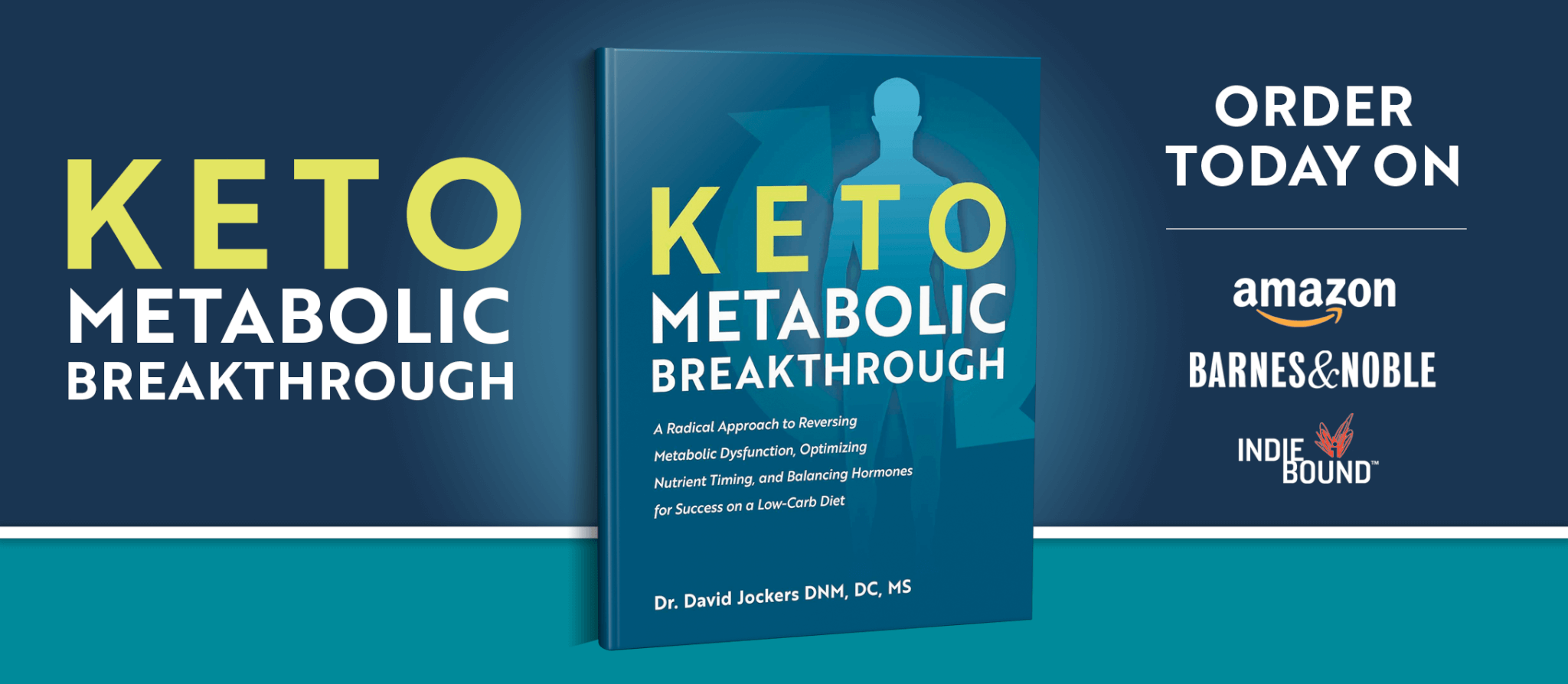


I want to know if the keto cellular diet will help regenerate a 15cm bone infarct in
My tibia due to total knee replacement done June 26, 2019? Thanks for any help you can give. Donna
Hey Donna, we cannot comment on that but a healing diet will create the best environment for your body to heal. Blessings!
Can you do this diet if you are dairy sensitive just by elimating dairy?
Yes absolutely!